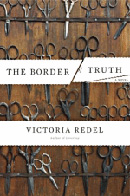
Sara Leader is a lonely, middle aged professor whose knowledge of her father's past is very limited. Between working on a hefty translation of German thinker Walter Benjamin's papers, undergoing a rigorous adoption process, and keeping an eye on her aging father, delving into family history does not seem to be a top priority. That is, until her adoption counselor urges her to look at her past to create a history for her baby. Sara begins to sort through her memories to try to piece together the puzzle of her family history. Using her experience as a researcher, and discussions with the daughter of her father's childhood best friend, Sara begins to uncover the untold stories of her father's escape from Nazi-occupied Europe aboard the refugee ship, the Quanza, and the sacrifices he made but has never revealed.
The Border of Truth alternates between the father's letters onboard the Quanza and a third person narrative of Sara's summer in 2003. Dramatic irony removes the reader's ability to uncover the Leader family secrets alongside Sara, instead focusing attention on Sara's journey to discover the truth about her history. As the story unfolds, Sara progresses from a lonely and unhappy woman to a person who ultimately finds her identity and, with it, closure.
Redel's ability to create complicated, dynamic characters with identifiable traits and personalities is definitely one of the strong points of the novel. In his letters, young Itzak Lejdel (who later becomes Sara's father, Richard Leader) is an exuberant and, at times, goofy youth with brains and a good imagination. The reader can connect with him because he is a typical teenage boy who reminisces of summer romances and dreams of being a movie star. Yet the letters also reveal his apprehension, anxiety and fear, especially when he pleads with Eleanor Roosevelt to save him and his mother from returning to Europe, where they would face death at the hands of the Nazis. Itzak comes across as eager, hopeful, endearing and even vulnerable which, in his later years as Richard Leader, he does not communicate to his daughter. Sara is well portrayed as a distracted woman who, despite her age, has not yet found her true identity. While doing research for her translation of Benjamin's works, she finds herself unable to focus; her lack of direction and overall dissatisfaction with life make her seem hopeless and resigned to a life of loneliness, which she hopes adopting a child will alleviate. As the story progresses, however, Sara becomes stronger and more aware of what she wants and needs from her relationships with people and the path she has chosen in life.
There are some weak points in the novel: the inclusion of unnecessary characters, as well as Sara's relationships with a
married man and with her best friend (who doles out doses of "tough love" as though it were candy), neither of which play
a major role in the story. Regardless of these slight weaknesses, The Border of Truth is a beautiful tale of a father's
instinct to protect his daughter from his past, and a woman's efforts to uncover the truth behind her father's story so that
she can create her own identity.

Counterpoint, paperback, 9781582434063
